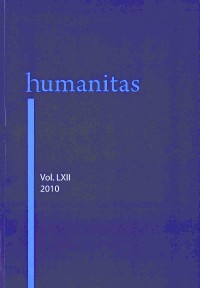Please use this identifier to cite or link to this item:
https://hdl.handle.net/10316.2/8534| DC Field | Value | Language |
|---|---|---|
| dc.contributor.author | Tobías Nápoli, Juan | - |
| dc.date.accessioned | 2013-01-22T10:41:15Z | |
| dc.date.accessioned | 2020-10-02T10:06:19Z | - |
| dc.date.available | 2013-01-22T10:41:15Z | |
| dc.date.available | 2020-10-02T10:06:19Z | - |
| dc.date.issued | 2010 | - |
| dc.identifier.issn | 2183-1718 | - |
| dc.identifier.uri | https://hdl.handle.net/10316.2/8534 | - |
| dc.description.abstract | Bacantes de Eurípides se convierte en una reflexión metadiscursiva sobre el concepto del género y sobre el carácter espectacular de la representación. De tal manera, creemos que la obra constituye una oportunidad única para analizar el modo en que los poetas contemplaron el fenómeno del género trágico en su carácter de representación. Intentaremos demostrar que, en los últimos años de su carrera teatral, el poeta se habría planteado una reflexión acerca del fenómeno del teatro: para ello se analizarán los valores de los distintos espacios en los que se desarrolla la trama de cada una de las acciones dramáticas y la inagotable cantera de procedimientos autorreferenciales: la presencia de una obra dentro de otra obra, la reflexión sobre las emociones que el teatro debe producir sobre los espectadores, los casos en los que un personaje se refiere a sí mismo o a los demás como a un actor y a sus acciones como a representaciones teatrales, y la referencia a la condición teatral de la escena. | spa |
| dc.description.abstract | Euripides’ Bacchae becomes a metadiscoursive reflection on the concept of the genre and the spectacular nature of the performance. Thus, we believe that the work is a unique opportunity to analyze how the poets beheld the phenomenon of the tragic genre in its character of representation. Our claim is that, in the last years of his theatrical career, the poet would have proposed a reflection on the theatrical phenomenon. In order to support this claim, we will analyze the values of all the different spaces in which the plot of each one of the dramatic actions is developed and the inexhaustible source of self-referential procedures on the theater: the presence of a play within a play, the reflection on the emotions that the theater must produce on the spectators, the cases in which a character refers to himself or others as an actor and to his actions as theatrical performances, and reference to the theatrical condition of the scene. | eng |
| dc.language.iso | spa | - |
| dc.publisher | Faculdade de Letras da Universidade de Coimbra, Instituto de Estudos Clássicos | - |
| dc.rights | open access | - |
| dc.subject | Euripides | eng |
| dc.subject | Tragedy | eng |
| dc.subject | Bacchae | eng |
| dc.subject | Theatricality | eng |
| dc.subject | Tragedia | spa |
| dc.subject | Bacantes | spa |
| dc.title | Espectáculo y teatralidad en Bacantes de Eurípides | por |
| dc.type | article | - |
| uc.publication.collection | Humanitas vol. LXII | - |
| uc.publication.firstPage | 57 | - |
| uc.publication.lastPage | 82 | - |
| uc.publication.location | Coimbra | - |
| uc.publication.journalTitle | Humanitas | - |
| uc.publication.volume | 62 | por |
| dc.identifier.doi | 10.14195/2183-1718_62_6 | - |
| uc.publication.section | Artigos | - |
| uc.publication.orderno | 6 | - |
| uc.publication.area | Artes e Humanidades | - |
| uc.publication.manifest | https://dl.uc.pt/json/iiif/10316.2/8534/255060/manifest?manifest=/json/iiif/10316.2/8534/255060/manifest | - |
| uc.publication.thumbnail | https://dl.uc.pt/retrieve/11984801 | - |
| uc.subject | Eurípides | spa |
| uc.subject | Teatralidad | spa |
| item.fulltext | With Fulltext | - |
| item.grantfulltext | open | - |
| Appears in Collections: | HVMANITAS | |
Files in This Item:
| File | Description | Size | Format | |
|---|---|---|---|---|
| humanitas62_espect_culo_y_teatralidad_en_bacantes_de_eur_pides.pdf | 397.17 kB | Adobe PDF |  |
Items in DSpace are protected by copyright, with all rights reserved, unless otherwise indicated.
